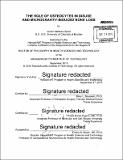The role of osteocytes in disuse and microgravity-induces bone loss
Author(s)
Spatz, Jordan Matthew
DownloadFull printable version (12.89Mb)
Other Contributors
Harvard--MIT Program in Health Sciences and Technology.
Advisor
Mary L. Bouxsein and Paola Divieti Pajevic.
Terms of use
Metadata
Show full item recordAbstract
A human mission to Mars will be physically demanding and presents a variety of medical risks to crew members. It has been recognized for over a century that loading is fundamental for bone health, and that reduced loading, as in prolonged bed rest or space flight, leads to bone loss. Osteocytes, the most abundant bone cell type, are thought to be key mechanical sensors in bone, yet the molecular mechanism of this action remains poorly understood. Improved understanding of how osteocytes regulate skeletal responses to mechanical loading and unloading could have significant implications for treatment of bone disorders related to disuse or immobilization. Thus, we conducted in vitro and in vivo studies on osteocytes exposed to unloading to investigate their role in disuse and microgravity-induced bone loss. Specifically, we generated and characterized a novel osteocytic cell line that recapitulates the response to hormonal and mechanical stimuli of osteocytes in vivo. This novel cell line provided the first evidence of a cell-autonomous increase in sclerostin, a potent inhibitor of Wntsignaling, following exposure to simulated microgravity. These cells were also used for a spaceflight mission after demonstrating their ability to maintain an osteocytic phenotype when cultured in a fully automated flight-certified system. Finally, we utilized murine models of unloading to show that pharmacologic inhibition of sclerostin induces bone formation and prevents disuse-induced bone loss.
Description
Thesis: Ph. D., Harvard-MIT Program in Health Sciences and Technology, 2015. Cataloged from PDF version of thesis. Includes bibliographical references.
Date issued
2015Department
Harvard University--MIT Division of Health Sciences and TechnologyPublisher
Massachusetts Institute of Technology
Keywords
Harvard--MIT Program in Health Sciences and Technology.